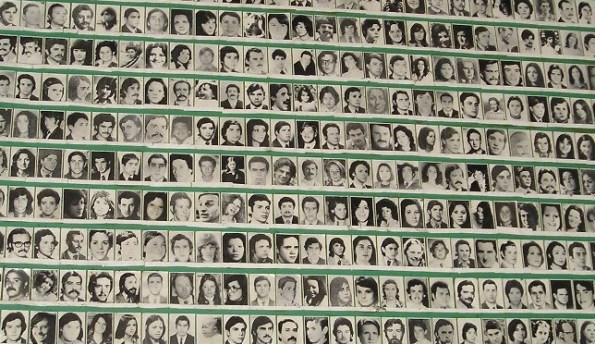The Mothers of Plaza de Mayo;
Argentina’s Dirty War
 |
| Las Madres Protesting in Plaza de Mayo |
 |
| An image of just some of the many missing children from Argentina's Dirty War |
To me, the rejection of second wave feminism by Las Madre’s was something
I felt they were entitled to as second wave feminism only truly catered to
white, middle class women who were told to leave the home, join the workforce
and dismantle the patriarchy. Las Madres were making their personal political;
they were fighting for answers for their missing children and grandchildren
that the Argentine government had stolen from them. Las Madres “rallied around
their common identity as mothers [and grandmothers] to bear witness to their
experiences and confronted the authoritarian government in the public on moral
rather than political grounds” (Fraser 37).
The Madres put up with harassment, they lived in fear of the
Government themselves yet they persevered as a group of women who stood
together to fight for what they believed was socially and immorally wrong. It
was said that “Las Madres were viewed by many feminists as apolitical beings
who were none the less permitted—to an extent—an interest in social issues as
an extension of their mothering role” (Howe 44). But the role of a mother is a
job within itself and that frame of mind is something that the second wave of
feminism failed to accept. It’s no wonder these women rejected feminism; they
felt they had no place in the movement. Would you not feel the same? But what
the feminist movement failed to acknowledge is that this was a group of women
who stood together to protest something they believed (and was) a political
issue that the Argentine government was called to address.
Another
interesting political point is that Las Madre's occupied space that the
government didn't intervene in. Instead these mothers and grandmothers
walked in public, denouncing the Governments actions but were not punished,
detained and murdered for their actions. However, if they were not a group of madre's
or grandmothers would they have had the same security? Their children
were protesting against the Argentine government and were deemed
"terrorists and subversives" (Fraser 37)
but instead the “government
focused on diminishing the legitimacy of Las Madre's; having the
press refer to these women as the Locas de la Plaza de Mayo (meaning the
crazy mothers)” (Fraser 37). How ironic,
women who protest the government by acting and taking a stand against it
are labeled as crazy. It's no surprise that the Argentine government would
use terminology such as that to undermine this movement. After all; women
are dismissed as hysterical and delusional in society today when we speak
up against what we feel is morally and politically defective. But back to the
question of security, the Madre's had control for the simple fact that they
were, indeed, mothers. “Their very presence was a statement of security,
as women did not traditionally have a role in politics” (Fraser 37) so the fact
that these women, mothers at that, formed a group that protested the governments
actions shows that “success in overcoming the silence and opening a public
discourse while raising national and international support for their cause
shows that entrenched enemy images can be overcome” (Fraser 38). As they say,
there is power in numbers and when the personal becomes political and
is inclusive and intersectional women's voices cannot be dismissed.
 |
| The Argentinan Government forcefully detaining what they described as a "terrorist". |
Works Cited
Fraser,
H M. “"Los Desaparecidos": The Madres of the Plaza de Mayo and the
Reframing of the Victims.” Canadian Woman Studies, vol. 27, no. 1,
2009, pp. 36–39. Proquest, Accessed 18 Feb. 2017.
Howe,
Sara E. “The Madres de la PLaza de Mayo: asserting motherhood; rejecting
feminism?” Journal of International Women's Studies, vol. 7, no. 3,
Mar. 2006, pp. 43–50., Accessed 18 Feb. 2017.

No comments:
Post a Comment